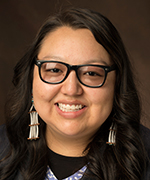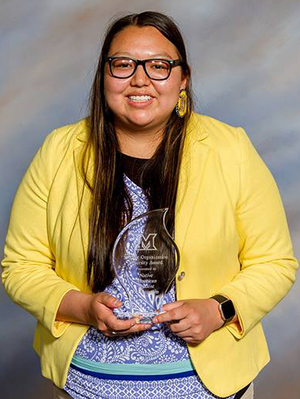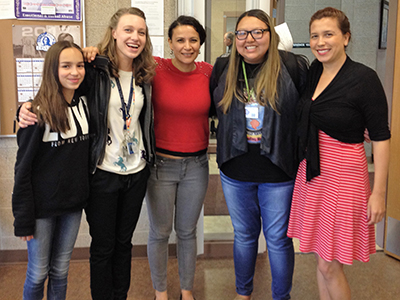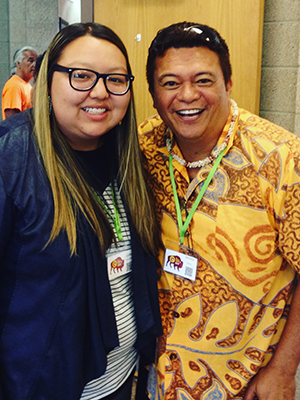
- senior Anthropology major
- minor in Political Science
- from Rosebud, SD
- College of Arts and Science Ambassador
- recipient of the 2019 President's Distinguished Service Award
- created the Hamilton campus chapter of the Native American Student Association
- helped develop language curriculum at Lakota Summer Institute in North Dakota (Summer 2017)
"Looking back, my internship experience was really an affirmation for me…By creating meaningful and impactful work that I feel will continue beyond what I did that summer, I realized that being both an anthropology major and political science minor has given me new and enriching ways to help."
Why Miami?
"My grandmother, associate professor Sandra Garner teaches courses in American studies in the Department of Global & Intercultural Studies, and it was through her that I learned about Miami. I visited campus during my senior year in high school and decided to apply through Miami's Hamilton campus. During my second year, I started to take classes on the Oxford campus, and have been a student on both the Oxford and Hamilton campuses for the past three years.
"Coming from the Rosebud Indian Reservation in South Dakota, moving to Ohio was initially a difficult process. My grandmother played a big part in guiding me through this transitional period. When I first came to Miami Hamilton, I had entered a new environment with no connections or friends. It wasn't until I found the Office of Diversity and Multicultural Services that I found a sense of place and belonging on campus. Here I made new friends that I now consider family, at a center that I call my second home. I owe a large part of my success at Miami to the Diversity Office, because they supported and believed in me from the very beginning."
Best Miami Experiences

Lydia Yellow Hawk holds the Student Organization Diversity Appreciation Award for the Hamilton chapter of the Native American Student Association.
"I started at Miami as a biology major, thinking that I'd eventually go into dental school, so I was mainly taking science courses my freshman year. Then, during my spring semester, I took an anthropology class with instructor Erika Nelson called Peoples of the World [ATH 175], and I absolutely loved it! For me, it was the first time I really got to learn about other cultures, peoples, and their worldviews. We did a project where we had to interview someone from a different country, and the class literally gave me a new perspective of looking at the world.
"After that class, I became interested in anthropology and decided to take another course. I enrolled in Cultural Anthropology [ATH 231], where I did a semester long service-learning and ethnography project at the Booker T. Washington Community Center in Hamilton. During this project I worked closely with elders from the second ward, and learned more about their experiences growing up in Hamilton. This class was taught by associate professor John Cinnamon, and motivated me to stay in anthropology and switch my major from biology. I left this class with new experiences and skills that still impact the way I view world, but more importantly how I understand myself within it.
"Besides Dr. Cinnamon, who helped introduce me to cultural anthropology, I was strongly influenced by associate professor Leighton Peterson, whose research partly focuses on native studies, which is one of my interests. During my time at Miami, I've a taken a few courses with Dr. Peterson that examined the work anthropologists have done in Native North American communities [ATH 304/364], from both linguistic and cultural anthropological perspectives. Anthropology's history as a discipline in the U.S. with Native peoples, is really quite interesting because it received its foundation studying indigenous cultures through salvage ethnography. In an independent study, advised by Dr. Peterson, I was able to create a project that takes a reflexive critical approach to this history, and synthesizes my interests in anthropology and native studies through the works of early Dakota Boasian linguistic anthropologist, Ella C. Deloria.
"During my junior year I became interested in politics and law and decided to pick up a minor in political science because of the #NoDAPL movement on the Standing Rock Reservation in North Dakota. And also because my father, served on the Rosebud Sioux Tribe tribal council for many years as my community's representative. I wanted to learn more about the U.S. intergovernmental relationships between federally recognized tribes, the states, and federal government.
"I'm thankful for my political science instructors such as chair of political science Bryan Marshall and associate professor John Forren (at the regional campuses) because they were supportive in allowing me to explore this interest in their classes. So I've learned about the interplay between tribal nations and the U.S. government from both a U.S. congressional (legislative) and constitutional law perspectives.
"I am incredibly grateful for the continued support and encouragement provided to me by the professors I've mentioned so far, because they took an interest in me both in and beyond the classroom in regard to my goals, future, and aspirations.
"When I came to Miami I wanted to meet other Native students and learn more about their experiences. But I was disappointed to find that Miami did not have a support center or active student organization for Native American students, beyond Myaamia students. So in Hamilton, I created a chapter of the Native American Student Association (NASA). Through NASA, I was able to collaborate with current NASA members, student organizations and departments at Miami University to organize events, initiatives, and campaigns throughout the year on Native American and Indigenous topics, celebrations, and peoples.
"I have really enjoyed being the president of NASA because it is through our events that students learn about Native peoples in many different capacities, whether that be at an event, group discussion, or over a meal. NASA is also different, in that we do programming on the Oxford, Hamilton, and Middletown campuses, so our reach and efforts impact a variety of students from different backgrounds. In May 2018, NASA received the Student Organization Diversity Appreciation Award for our accomplishment of bringing together the campus community in learning about Native American heritage. Being a part of NASA has been one of my best Miami experiences!"
Miami and the Liberal Arts
"I've received a wide breadth of knowledge in all sorts of different disciplines at Miami. Through the Miami Plan I've taken courses in statistics, psychology, Native American literature, and anthropology, and in the case of anthropology I was encouraged to pick it up as my major. I believe the Miami Plan and College of Arts and Science gave me a well-rounded education in allowing me to take all these different courses towards my degree. One of my favorite classes outside my major was State and Local Government and Politics [POL 368], taught by Dr. Forren, where we read hundred-year-old cases to determine how they shaped and impacted today's laws and policies.
"Thinking about my community on the Rosebud Reservation, I would like to work with other indigenous peoples either through my tribe or on a national level with an American Indian organization that focuses on advocating for indigenous rights. My liberal arts education and anthropology and political science courses, I feel really have prepared me for what I eventually want to do."
Creating a Lakota Language Curriculum to Preserve Tribal Heritage and Culture

Lydia Yellow Hawk (second from right) with Lakota Summer Institute instructors and students at Sitting Bull College.
"During summer 2017 at the Lakota Summer Institute (LSI) on the Standing Rock Reservation in North Dakota, I interned with two different programs that coordinate LSI at Sitting Bull College (SBC). The first program is the Lakota Language Consortium (LLC), a nonprofit organization that aims to revitalize the Lakota language by providing language infrastructure support, hosting Lakota language workshops, and co-sponsoring LSI. The second program was with the Language and Culture Institute, a tribal program for the Standing Rock Sioux Tribe (SRST) that promotes Lakota and Dakota language and culture.
"During this internship I got to work closely with tribal community educators, cultural leaders, LLC linguists, media experts, and education developers to help develop and promote the Lakota language at LSI. This involved me working both behind the scenes and in the classroom at LSI.
"I discovered the LSI internship through a Facebook post, applied, and then worked with Dr. Cinnamon to line it up with my anthropology major. The LSI instructors and I then worked to create a month-long Lakota language curriculum to be used with Lakota language learners of all levels, from children to elder adults.
"My position required me to do about 4 weeks of training with the instructors about how to register students and teach Lakota — and I also had to take classes in the language itself! I'd been exposed to Lakota for most of my upbringing, because my father was a native speaker and my grandmother was a Lakota language instructor at Sinte Gleska University for many years, but I needed to take more advanced courses on Lakota morphology, syntax, and song and dance.

Lydia Yellow Hawk with Lakota Summer Institute instructor Nāʻilima Gaison
"I also got to trial a new course that was being taught at LSI on Indigenous Languages and Language Immersion Methods. This course was taught by Native Hawaiian Nāʻilima Gaison, a professor at the University of Hawaii. Gaison is the co-founder of one of the first Hawaiian immersion schools in Hawaii, and he showed us how to incorporate Indigenous perspectives and beliefs into our language curriculum. It was encouraging to see another Indigenous language being successfully taught and revitalized. I was also able to learn some of the Native Hawaiian language!
"This was my first experience working in tribal community organization and language revitalization. At the LSI, I was able to enhance my Lakota language skills and built a network with people from the Lakota Summer Institute as well as many tribal representatives from Standing Rock.
"After writing about my experiences at LSI in a paper for Dr. Cinnamon, I received the Outstanding Student in Anthropology award at Miami's Hamilton campus. I've also been inspired to keep up my studies of the Lakota language, and continue to practice speaking and writing in Lakota with family and other Lakota language learners.
"Looking back, my internship experience was really an affirmation for me, because after this experience I knew I wanted to work with tribal communities. It was great to work so closely with people who were passionate about teaching and learning Lakota and wish to maintain their Lakota heritage and identity. This is where I see myself, not just as a student but also as a tribal member. By creating meaningful and impactful work that I feel will continue beyond what I did that summer, I realized that being both an anthropology major and political science minor has given me new and enriching ways to help."
Advice to Students
"I tell students who come to the Office of Diversity and Multicultural Services that they should get involved with the campus community, whether that's in Hamilton or Oxford. There are plenty of opportunities, such as extracurricular activities, a campus job, and service work.
"In particular for me, being a part of a group like NASA has helped me gain valuable leadership and communication skills that I can carry on after graduation. Just find a way to get involved and make an impact on campus!"
[April 2019]
 Miami University Oxford, Ohio est. 1809
College of Arts and Science
Miami University Oxford, Ohio est. 1809
College of Arts and Science
 Miami University Oxford, Ohio est. 1809
College of Arts and Science
Miami University Oxford, Ohio est. 1809
College of Arts and Science